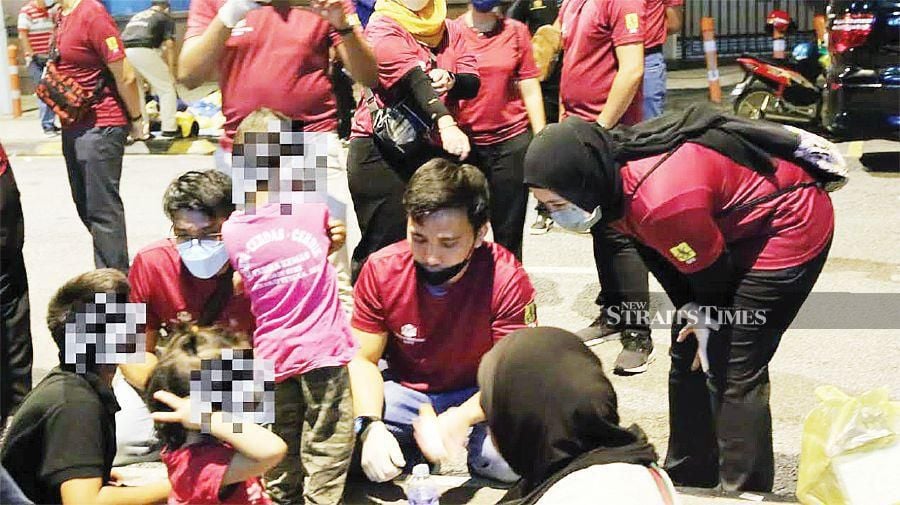One of the problems faced by developing nations is the disparity in wealth between citizens.
As a country races towards development, inevitably there will be pockets of society that will struggle to catch up, and just not seem to make ends meet.
This group is the urban poor, or in extreme situations — the homeless and the left-behind.
In an effort to see first-hand this social problem, a group of young Malaysian diplomats last weekend spent their Friday night with local non-governmental organisation (NGO) #FoodForGelandangan on the streets of Kuala Lumpur.
The 21 junior officers — on the cusp of their first posting abroad — had the opportunity to walk past famous Kuala Lumpur landmarks to where the homeless and urban poor live.
They were joined by two senior diplomats, ambassadors Azhar Mazlan and Khairi Omar, for the walkabout.
It was an eye-opener, not least because they were not used to walking around (on foot, no less!) in Kuala Lumpur after midnight.
For some, they could not fathom how the homeless could come to be — in the shadows of places like the Central Market, Masjid Jamek and Masjid Negara, well-lighted and oft-visited places.
Others said that while they knew of the problem, they had never had to encounter this part of society first hand.
For Sarawak-born Klarissa Low, this was not her first time with the NGO. She knew what to expect.
Yet, having the full support of her coursemates, and two teams of paramedics (with ambulances), could not compare.
She recounts: "I had never done a charity drive like this before, so my first time was with #FoodForGelandangan. Speaking to the homeless, hearing their stories and their problems, I was touched.
"This second time, with my coursemates, there were less homeless people, and that's a good thing all around."
Another junior diplomat, Alya Elyda Shamsul, said: "The experience at Chow Kit with the urban poor impacted me the most. Were these the ordinary people who had fallen through the cracks of development?"
The problem of the homeless is a persistent headache for any country, Malaysia included.
Some are homeless because of pride — having left their hometowns in search of a better life or job. They cannot return for fear of shame. So, they continue to eke out whatever living they can while still looking out for job security.
Before the pandemic hit, there were migrants who called the streets their home simply because they either could not or would not afford rent.
These were the night-time homeless. They would make their "temporary nest" once they finished their day job. When dawn broke, they would gather their belongings and go to work.
For diplomats, sessions such as these walkabouts allow them a better feel for their own country. It is one of the sensitising sessions the Institute of Diplomacy and Foreign Relations (IDFR) has developed over the years.
Other sessions in the course of IDFR's 30-year history include heritage trails, farm visits and orphanage centres.
Course coordinator Norli Muadza, whose foreign postings have taken her to the Netherlands and Italy, believes that junior officers should be sensitised early.
"At their post, they are expected to mingle with the locals as part of their outreach programme," says Norli. "Why not start the public diplomacy here, in our own country?" she adds.
The adage of diplomats being able to "talk to peasants and dine with kings" is sometimes scorned as being elitist, but it is often a reality.
As envoys, they need to be able to move with the influencers of a country — in the olden age it was the monarch — and connect with ordinary folk in order to promote their country and its wares.
Diplomacy is all about connecting with your audience. These young diplomats are well on their way to being as good as, if not better, than the envoys of old.
Dressed in simple maroon T-shirts, jeans and comfortable shoes for their night-time excursion with the homeless, they were so far removed from the dapper gentlemen and resplendent ladies at the black-tie event just the week before.
Looking at them, I can't help but think that we are in good hands — for on these slim young shoulders rest the heavy future of our country.
The writer is a foreign service officer who has served in bilateral and multilateral posts. These days she often finds herself between idealism and realism, between reality and the academic
The views expressed in this article are the author's own and do not necessarily reflect those of the New Straits Times



